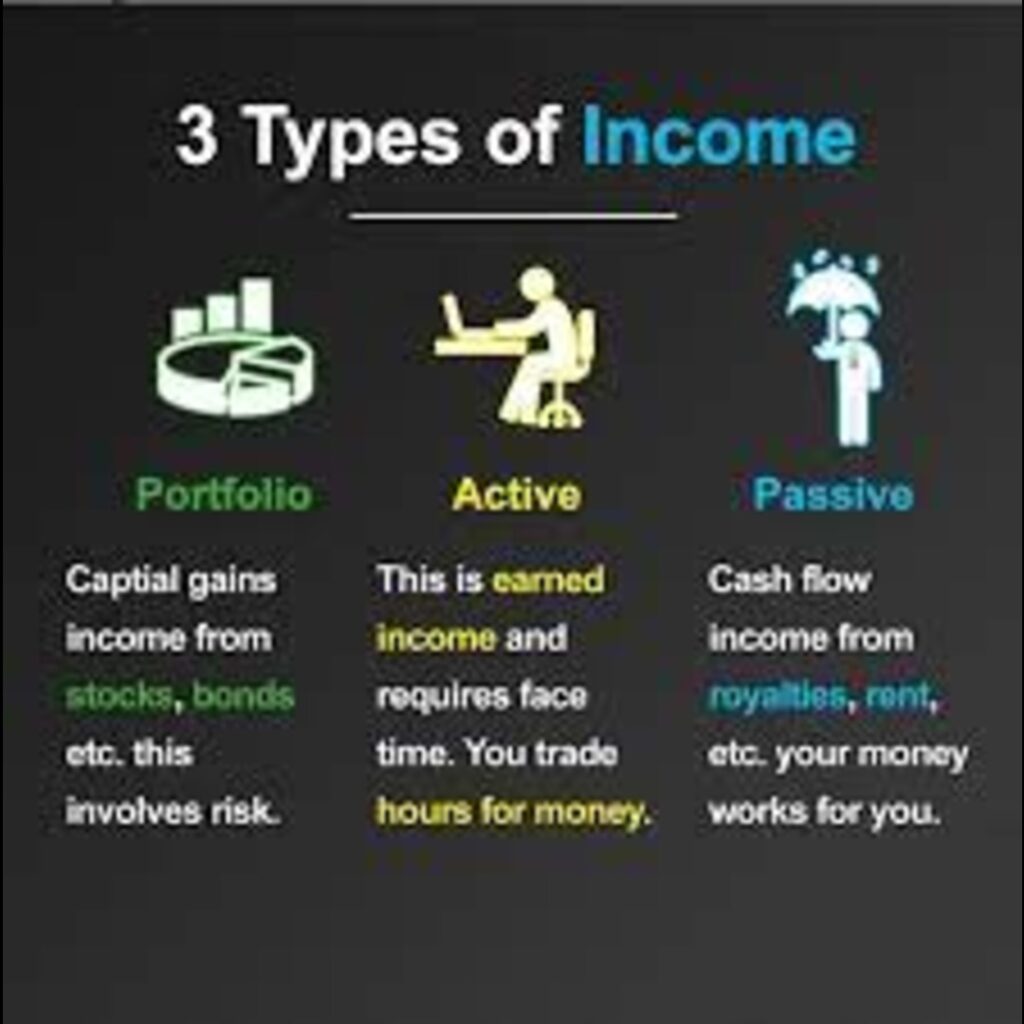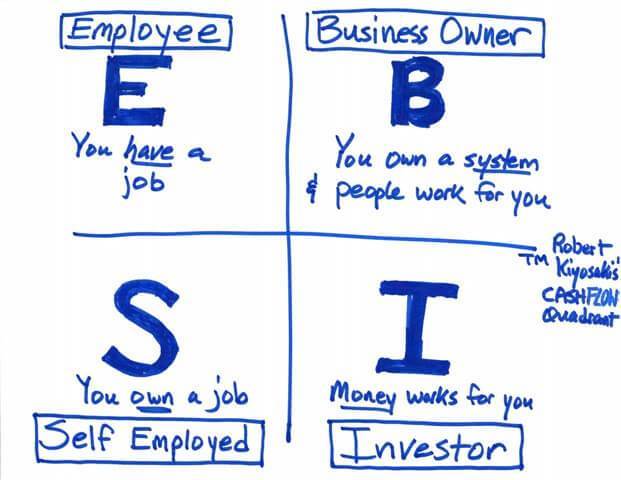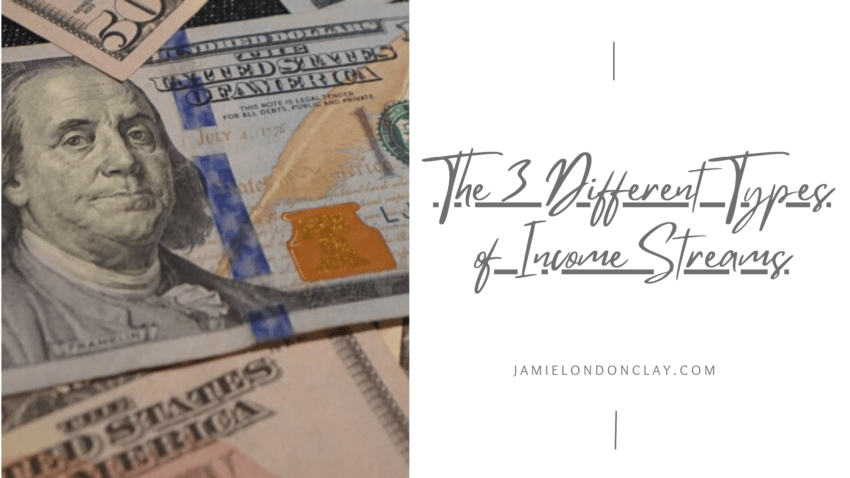The 3 Different Types of Income Streams

Being paid every month or day, come rain or shine, sounds incredible, right? It all depends on the different types of income streams you create to achieve this kind of goal.
I spent much time playing Monopoly® with my family and friends as children. And I still play the game as an adult.
We played for hours, exchanging four greenhouses for one red hotel.
Buried in that simple formula. It was a powerful lesson that has served me well throughout my adult life: the value of cash flow.
Monopoly® is a game that teaches you how to create positive cash flow. You buy a property and collect rent when someone lands on your property.
To make money, much like in real life, you improve the value of your properties and eventually sell them.
You increase your cash flow when you move on from single-family homes (greenhouses) into more significant properties like duplexes, 4-plexes, and apartment complexes (red hotels).
I learned about cash flow early at an early age by playing Monopoly®. Unfortunately, most people, including myself, never learned the lesson of cash flow.
And even with what we learned, we still needed to put in place the game into our real lives.
Because I am an honorary daughter of Robert Kiyosaki’s Rich Dad, Poor Dad family…
My rich dad’s lessons are about the three types of income and the cash flow advantages of passive income. They have entitled me to make money differently than someone who follows traditional advice.
Most people are advised to go to school and get a safe, secure job. And invest in a diversified portfolio of stocks, bonds, and mutual funds.
By creating cash flow, I will proceed to become a multi-millionaire. And one of the key reasons I will become wealthy. This is because I understand the three diverse types of income. And their relationship to cash flow.
Let’s take a look…
The 3 Types of Income

Income Type #1 – Earned Income
If you have a job and receive a paycheck, you make money through earned income.
To reference the CASHFLOW® Quadrant, Employees (E) and Self-employed (S) people. Those on the left side of the quadrant – make money through earned income.

Examples of earned income.
When you earn money through a paycheck, you exchange time for money.
When you work as an employee, web designer, grocery store cashier, or police officer, you’re getting paid a predetermined amount of money (X) to do that job for a specific time (Y).
Here in the U.S., the amount of money is negotiated between the employee and employer. The amount of time required for a full-time employee is 40 hours per week.
The advantages of earned income.
- Earned income is a viable choice for those with a low financial I.Q.
- The formula is straightforward. I’ll do X job, and you’ll pay me Y money.
- If a good economy is very stable and you do the job well. You can count on a certain amount of money coming into your pocket each month.
- You may get a raise and even more money in your pocket if you do an outstanding job.
Almost everyone thinks a high-paying job is the most secure thing you can have.
But my rich dad believed differently… and so did I.
Here is why…
The disadvantages of earned income.
- Many people make their money through earned income. It’s often enough to cover basic monthly expenses, leaving little to no money to invest.
- For most Es and Ss, the saying, “Living paycheck to paycheck,” explains their status. Suppose they want to make more money. They need to work more hours at their full-time job through a part-time job or as a freelancer.
- But even for highly paid employees, earned income still needs to be stable. If the economy crashes or the company is mismanaged, or there is another pandemic, your job can be lost instantly.
Unfortunately, millions of people discovered this during the COVID crisis. And many of those jobs aren’t coming back.
And worst of all, earned income is taxed the highest, something I’ll touch on in more detail later.
Income Type #2 – Portfolio Income
Where earned income is acquired by exchanging time for money. Portfolio income is made through capital gains.
Examples of portfolio income
- When someone buys stock in a corporation at a given price, they plan to sell it at a higher price.
So, if they buy a stock at $10 today, and the price goes up to $40 when they sell a stock, they make $30 in capital gains. That capital gain is their profit.
- Another example of portfolio income is house flipping.
You buy a run-down home in a nice neighborhood. Invest a lot of money upfront to improve it, and then hope you can sell it at a high enough price to make a nice profit.
This is how stock traders traditionally make their money. They invest money in stocks they feel are undervalued now. I expect that when the prices rise, they can sell those stocks for capital gain.
The advantages of portfolio income.
- Portfolio income can make you money in a short amount of time. Buying low and selling high is easy when the economy is on fire.
- Or, if you have insider information like day traders on Reddit who pushed up the price of GameStop a while back. You can get on the inside track of a rocket ship.
The disadvantages of portfolio income.
- It’s hard enough for sophisticated investors to make money with portfolio income because it’s speculation.
- As such, it can be unsafe, especially for those with a low financial I.Q. and following the herd.
- If you get in late in the game, you can get massacred by those who ran up the price… as many folks did with GameStop.
- Portfolio income is also at the mercy of the economy.
Many people were flipping houses in 2008. It became a rude awakening when the entire housing market collapsed overnight.
And because a home is a slow liquidity asset… most couldn’t sell in time to recover their losses.
And as with earned income, you pay remarkably high taxes with portfolio income. even when you realize a profit.
Income Type #3 – Passive Income
As mentioned, my rich dad used the formula “four greenhouses, one red hotel” in Monopoly. To describe how you can make a passive income. The third and final type of income.
It again referenced the CASHFLOW Quadrant—those on the right side, Business owners (B) and Investors (I). Make money by acquiring assets that provide consistent cash flow.
In Robert’s book, “Rich Dad Poor Dad,” he explains in greater detail what defines an asset. An asset puts money in your pocket regardless of whether you work.
Examples of passive income.
Sophisticated investors invest for passive income.
- Examples of passive income are rental properties that pay you cash flow through rents (just like Monopoly).
- It is owning a profitable business or creating a product like a book or a game. That pays you money each month in the form of royalties or subscriptions.
Advantages of passive income.
- The best advantage of passive income. Once you have an asset, it provides cash flow regardless of your work.
- Money keeps coming into your pocket. And you’re free to do other things… like finding more cash-flowing assets.
- Even better, the profits from cash-flowing assets. It can be used to get even more cash-flowing assets.
- And unlike portfolio income, you still own the original asset. Even if you use the cash flow profit to buy more cash-flowing assets, it’s a compounding effect.
- Passive income is the lowest taxed income. It’s almost like the government wants you to invest this way.
Disadvantages of passive income.
- It takes a high financial I.Q. and patience to invest for passive income. Two things most people in the world don’t have.
Most people have a low financial I.Q. It’s not their fault. But the same people were told to go to school, get a secure job, and invest in the long term in the stock market and also said that their house is an asset. The belief was that your house always goes up in value.
Only briefly ago (in 2008) did everyone realize that belief wasn’t true.
Some people saw the value of their home cut in half overnight. These homeowners realized that their home wasn’t an asset but a liability.
Where an asset puts money in your pocket, liability takes money out.
Again, let’s consider your home. Even if you own your house, you still have upkeep, property taxes, and utilities. If your house were an asset, it would make money for you, not take money from you.
Now that you have a basic understanding of the three types of income. It’s time to understand how each affects your most significant expense: taxes.
Ordinary earned income is how most people make a living. It’s also why most people are considered poor or middle-class.
But the reason most people are designated poor or middle class. It has nothing to do with how much money they make but how much they keep.
The most significant expense for an E or S on the left side of the CASHFLOW® quadrant.
Isn’t their mortgage, car payment, or credit card bill? The most significant expense for people. Those who make a living with ordinary earned income are their taxes.
People who earn income through a job (either as an employee or a sole proprietor/small business owner). Lose roughly 50% of their money through taxes.
Earned income is the most taxed of all three types of payment.
Making money through portfolio income won’t save you much with your taxes, either. No matter how much you make selling stock or real estate, you’ll be taxed at approximately 20%.
Using the previous example about buying and selling stocks (in the portfolio section). Buying 1,000 shares of stock at $10 and selling the shares for $40 will make $30,000 in profit.
Buy 10,000 shares @ $10 = $10,000
Sell 10,000 shares @ $40 = $40,000
Profit = $30,000
But, once you take 20% off the top for taxes, you would be left with $24,000.
Though you would still make a lot of money, imagine paying nothing in taxes – legally.
When you invest in your financial education and start earning passive income. You’ll know how to achieve without a job and pay fewer taxes.
Passive income is taxed less than ordinary earned and portfolio income because of reasons found in the tax code.
I won’t bore you with the details. However, it’s worth noting that the government benefits those who create jobs: Bs and Is.
The more jobs there are, the more workers are required to fill those jobs. The more people work, the more taxes can be collected.
In Conclusion
It would be best if you had a solid understanding of the three types of income. Earned, portfolio, and passive. And a basic understanding of how taxes affect each income stream.
I’m not implying one is better than the other. I aim to educate you on the different income options available.
I’m also not here to tell you which of the three types of income you should spend your time acquiring. That’s a personal decision.
Are you happy collecting small deals (greenhouses), or are you playing to win (playing for big deals)?
How you answer that question might hold the key to which type of income is right for you.
I highly suggest you read N.Y. Times’ Best-Selling Author, Rich Dad Poor Dad.
The great pandemic has caused all sorts of problems for businesses and economies around the world.
It’s made people realize how unstable specific industries are.
There is good news, in any case. The pandemic has also been “proof.” That some industries can survive and even thrive during a recession.
One of those industries is getting commissions for selling other people’s products. Or create your own.
Over 100,000+ companies are willing to partner with you today – even if you don’t have any experience.
At Wealth Affiliate, we use a time-tested, proven method to collect weekly commissions. I’ll show you how to get started today!
If you have any questions about the topic at hand, please feel free to comment below! I welcome your feedback. Follow me on all social media platforms!
And stay connected by signing my email list.



What’s crazy is that at the time of reading this I had just had that conversation with my friends yesterday that we should play monopoly more often. Thing is its so hard to get people in one place at one time to play for a reasonable amount of time.
Also when you mentioned Rich Dad Poor Dad that hit home for me because that book got me to ironically reading more books because it taught me what is the difference between an asset and liability. And the biggest asset I realized I had was me and my mind. So that book was the first book that started my reading journey to self improvement.
Hi Thomas!
Rich Dad Poor Dad was the book that began my journey of self-improvement too. It absolutely influences my views. It changed my perspective.
Thank you for sharing your thoughts!